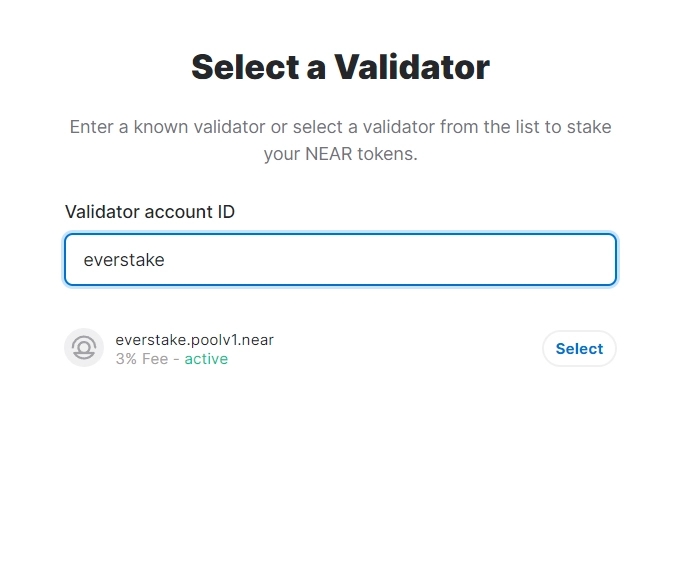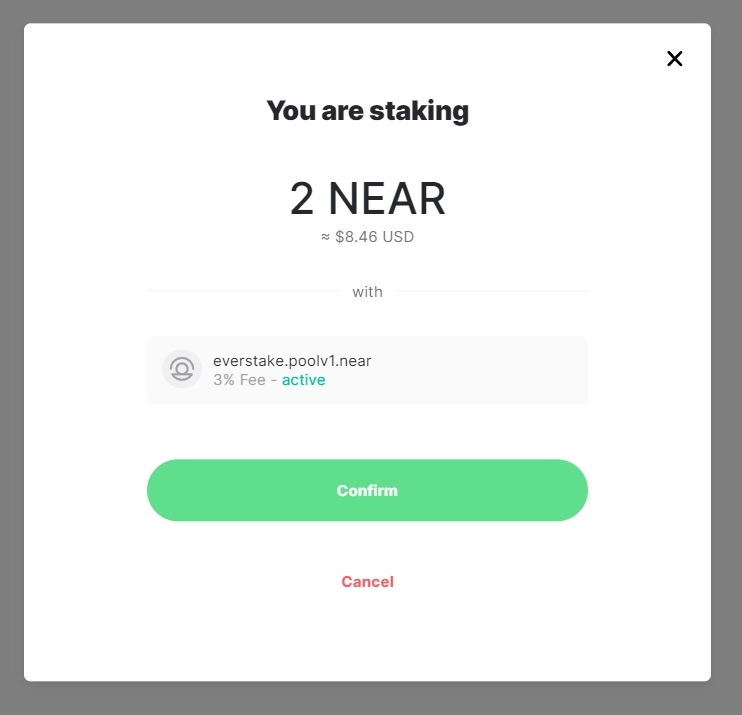Near (NEAR)
What is Near?
NEAR is a sharded, Layer-1 proof-of-stake blockchain focused on usability, low fees and fast finality (consumer-grade UX, developer tooling, and scalability).
How to stake Near?
Near Staking Manual
Step 1: Choose Your Wallet
To start, you need a wallet that supports NEAR staking. For this guide, we will use the NEAR Wallet.
How to Create a Wallet
Visit the NEAR Wallet website or download the mobile app.
NEAR Wallet was designed for simplicity, featuring a flexible account model and human-readable accounts. This means you can choose any username instead of a random sequence of letters and numbers.
During the setup, you’ll be provided with a seed phrase. Be sure to write it down and keep it in a secure location.
Finally, deposit at least 2 NEAR tokens to your new wallet address, and it will be ready for use.
Step 2: Select a Staking Pool
The next step is to select a staking pool, also known as a validator, who will stake your tokens on your behalf and distribute your rewards.
How to Choose a Validator
Open the staking section by clicking on the Staking tab.
When choosing a validator, it’s crucial to select one with a good reputation, maintained by a professional team.
Monitor the validator’s uptime, check if they have enough staked NEAR tokens to avoid being removed from the validator set, and confirm they regularly update their node. This information can be found on the NEAR Explorer and Nearscope Explorer.
One example of a reliable validator is Everstake. At Everstake, we regularly update our delegators about any changes, ensuring they receive their rewards on time. Our team is readily available on Discord, Twitter, or Reddit for any staking-related inquiries.
After careful consideration, choose your preferred validator from the list, input their name (for instance, ‘everstake.poolv1.near’ for Everstake), and confirm that you agree with their fee structure. You’re now set to start staking your NEAR tokens!

Step 3. Delegate
Choose the amount of tokens you want to stake (or choose the “Max” option). Once you’ve selected a validator and entered the NEAR amount you wish to delegate, proceed to confirm the transaction.

Step 4. Get rewards
By default, rewards in Near are auto-compounded, implying that they get included in your staking balance every epoch. You can withdraw your rewards as soon as the “Withdraw” option is available. However, you’ll need to wait a certain amount of time for security reasons before withdrawing (approximately 52-65 hours).

Where can I stake Near?
You can choose a crypto wallet convenient for you and use the guide at the link or write to Everstake support and get more detailed information
Staking Details
Epoch duration
~12 hours
Everstake fee
6.00 %
Auto-compounding
Yes
Fee to activate the wallet
Standard NEAR transaction fees (typically minimal, around 0.0001 NEAR per transaction).
First reward info
Newly staked tokens are “activating” and generally start earning from the next epoch. Practically, you’ll see first rewards after ~1–2 epochs (commonly quoted as ~12–24h)
Reward frequency
Rewards are distributed each epoch (~every 12 hours).
Min amount to stake
No minimum staking amount required (though 0.1 NEAR recommended to cover fees).
Unstaking period
4 epochs (~52-65 hours / approximately 2-3 days).
Stake (de)activation time
Activation happens at the next epoch boundary; expect 0–1 epoch for activation (practically 12–24 hours until you see rewards).
Re-delegating activation time
Up to 96 hours.
Last Reward
Last rewards earned before unstaking.
Self-Bond
None
Active set
NEAR uses a dynamic validator set with approximately 100 validators
Slashing
No automated slashing currently implemented in NEAR Protocol. Theoretical manual slashing possible through governance, but not actively used.
Why Everstake?
Everstake is the №1 staking infrastructure platform, trusted by over 1.5M users and institutional clients worldwide. Committed to the highest standards of compliance with certifications such as SOC 2 Type II, CCPA/CRPA, ISO 27001, and GDPR, we deliver secure and reliable staking solutions across 30+ supported chains with a reliability rate of 99.98%
Our skilled team manages reliable infrastructure, prioritizing the safety of your funds. Delegating through Everstake offers opportunities to boost your yields while ensuring peace of mind about your token's security.
Everstake Participation
As a Near validator, Everstake contributes to the overall success and growth of the Near blockchain from the network's initial launch. Our technical expertise and robust infrastructure help maintain the reliability of the network. We are responsible for keeping systems up and running, which is crucial for the uninterrupted operation of the blockchain and the timely processing of transactions.
FAQ
What is NEAR?
NEAR Protocol (NEAR) is a cryptocurrency that powers the NEAR Protocol network and is used to pay for transaction fees and earn rewards for helping to secure the blockchain network via staking.
Someone may wish to purchase NEAR for the following reasons:
Participate in protocol governance: NEAR is used to empower the community to actively participate in the decision-making process of its protocols, ensuring a more democratic and inclusive approach to project management.
Stake NEAR: staking allows NEAR owners to earn potential rewards by actively participating in the validation of transactions.
Pay for transaction fees: These fees compensate validators for their work in processing and verifying transactions.
Near Tokenomics
When NEAR Protocol launched on April 22, 2020, it issued a fixed supply of 1 billion NEAR tokens. The distribution was carefully designed to promote decentralization, reward contributors and fuel long-term growth. Here’s how the tokens were allocated: Staggered vesting schedules and ongoing allocations help prevent any single group from gaining too much influence while ensuring a steady flow of resources for grants and development. For more details, see the official token distribution post here.
Community Grants: 17.2% (funding ecosystem growth initiatives)
Operation Grants: 11.4% (supporting foundational projects and partnerships)
Foundation Endowment: 10% (ensuring protocol sustainability)
Early Ecosystem: 11.7% (bootstrapping new users and developers)
Core Contributors: 14% (rewarding the technical builders)
Primary Backers: 17.6% (recognizing early capital providers)
Small Backers: 6.1% (broadening the investor base)
Community Sale: 12% (allocating tokens to wider supporters)
How Everstake deduces validator fee?
“Validator fee” refers to the rewards received by Validator for participating in the Blockchain network Validation process. Everstake determines the validator fee through a process involving analysis and consideration of various factors, such as network requirements, operational costs, and market dynamics.
Control over User's Funds
Validators don't have control over users' funds in blockchain networks. Instead, they validate transactions and participate in the consensus process based on the rules defined by the network protocol. Users retain control over their funds through private keys, which are used to sign transactions and authorize transfers. Validators' roles involve confirming the validity of transactions and blocks, but they don't have the authority to access or manipulate users' funds.
Rewards Distribution
NEAR stake accounts are auto-compounding, meaning rewards are automatically added to the staked balance at the end of each epoch. It typically takes about one epoch (approximately 12 hours) for a new stake to become active and start earning rewards, while unstaking requires a 4-epoch unbonding period (approximately 52-65 hours or about 2-3 days). The exact activation and deactivation times may vary depending on when within an epoch you initiate the staking or unstaking process.
Staking rewards on NEAR are funded through inflation, where new NEAR tokens are issued each epoch. The protocol was launched with an initial supply of 1 billion NEAR tokens and implements a fixed inflation rate of 5% per year. Of this annual inflation, 90% (4.5% of total supply) is allocated to validators and delegators as staking rewards, while the remaining 10% (0.5% of total supply) goes to the protocol treasury. Unlike Solana's declining inflation schedule, NEAR currently maintains a constant 5% annual inflation rate, though governance proposals have been discussed to potentially reduce this to 2.5% in the future.
The yield a delegator receives depends on the current inflation rate, the total amount of NEAR staked on the network, validator uptime, and validator commission. Validator commission is a percentage fee deducted from staking rewards before distribution to delegators. Uptime is measured by the validator's performance in producing blocks and chunks - validators must meet minimum thresholds (90% for block production and 60% for chunk production) or risk being kicked out of the active validator set for the next epoch. Validators earn rewards proportionally to their stake and adjusted uptime performance, which are calculated and distributed at the end of each epoch.

